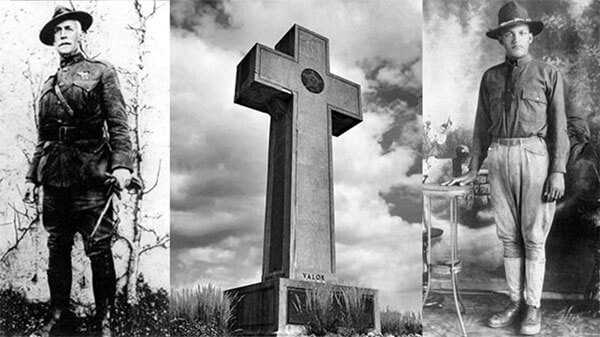
WASHINGTON — The U.S. Supreme Court has agreed to hear a case surrounding a World War I veterans memorial that had been challenged by the American Humanist Association as being unconstitutional.
The nation’s highest court announced on Friday that it had accepted an appeal in the case of The American Legion et al. v. American Humanist Association et al., which potentially could save the Maryland monument from being torn down. The Fourth Circuit Court of Appeals had ruled last year that the military tribute crosses the line into government endorsement of Christianity.
As previously reported, the Bladensburg memorial, also known as the “peace cross,” was erected in 1925 by The American Legion to honor the lives of 49 men from Prince George County who died during the war.
The cross stands 40 feet tall in Memorial Park, and also features a plaque that reads, “The right is more precious than the peace; we shall fight for the things we have always carried nearest our hearts; to such a task we dedicate ourselves.” The site is mainly used by The American Legion for Memorial Day and Veterans Day celebrations.
In 2014, the American Humanist Association (AHA) sued the Maryland-National Capital Park and Planning Commission over the presence of the cross, alleging that it violated the First Amendment to the United States Constitution.
“When the government erects an exclusively Christian monument on government property, it violates this central command of the Establishment Clause by sending a clear message that Christianity is the preferred religion over all others,” said AHA attorney Monica Miller in a statement surrounding the filing of the suit.
In November 2015, U.S. District Judge Deborah Chasanow, appointed to the bench by then-President Bill Clinton, ruled that the Bladensburg cross monument is constitutional because it is used for nonreligious purposes and is meant to honor war vets rather than promote any religious message.
“The monument’s secular commemorative purpose is reinforced by the plaque, The American Legion’s seal, and the words ‘valor,’ ‘endurance,’ ‘courage,’ and ‘devotion’ written on it. None of these features contains any religious reference,” she wrote. “[The construction of the cross] was not an attempt to set the imprimatur of the state on a particular creed. Rather, those who erected the cross intended simply to honor our nation’s fallen soldiers.”
AHA then filed an appeal with the Fourth Circuit Court of Appeals, which ruled 2-1 in October 2017 that the veterans memorial is unconstitutional. It said that because there are no other religious symbols in the park, the memorial sends the message that the government favors Christianity over other religions and “excessively entangles” the government with religion.
“Although the reasonable observer may recognize that the cross is located in the Veterans Memorial Park, such reasonable observer also could not help but note that the cross is the most prominent monument in the park and the only one displaying a religious symbol,” wrote Judge Stephanie Thacker, nominated to the bench by then-President Barack Obama.
“Further, the reasonable observer would know that a Latin cross generally represents Christianity. These factors collectively weigh in favor of concluding that the cross endorses Christianity—not only above all other faiths, but also to their exclusion,” she asserted.
Judge Roger Gregory, nominated by then-President Bill Clinton, dissented, opining that most observers would simply consider the display as a veterans memorial and not the promotion of religion. He noted that the courts have ruled that it is not necessary to scrub all traces of religion from public life in order to remain neutral.
“We must be careful not to push the Establishment Clause beyond its purpose in search of complete neutrality,” Gregory warned. “‘[U]ntutored devotion to the concept of neutrality can lead to invocation or approval of results which partake not simply of that noninterference and noninvolvement with the religious which the Constitution commands,’ but of extreme commitment to the secular, ‘or even active, hostility to the religious.’”
A request for an en banc—or full appeals court—rehearing was denied, but not without strong dissent from Judge Paul Neimeyer, appointed to the bench by then-President Ronald Reagan.
“The panel … will now have the monument removed or destroyed because, as it concludes, its presence on public land amounts to a violation of the Establishment Clause, although no Supreme Court case has ever held that the Establishment Clause prohibits such monuments,” he lamented.
“Indeed, it has held to the contrary—that ‘the Establishment Clause of the First Amendment allows the display’ of monuments like the one here.”
According to The Washington Post, more than 100 members of Congress joined an amicus brief to the U.S. Supreme Court in support of the cross memorial, as did Maryland Gov. Larry Hogan and Attorney General Brian Frosh.
The religious liberties organization Alliance Defending Freedom (ADF) also submitted a brief on behalf of several veterans groups, including Patriot Outreach, The Edwin A. Schumacher Marine Corps League, Detachment 740; The Society of 40 Men and 8 Horses Voiture 1543, and Maj. Gen. Patrick Brady (U.S. Army, retired).
“Because the less-religious alternative standard naturally whitewashes religious symbols from the public square, this court should grant certiorari and reaffirm that the Establishment Clause ‘does not oblige government to avoid any public acknowledgement of religion’s role in society,’ and that it does not ‘require eradication of all religious symbols in the public realm,'” the brief read in part.
Attorneys for The American Legion have expressed satisfaction that the U.S. Supreme Court has now agreed to hear the case.
“If this monument is bulldozed to the ground,” said Kelly Shakelford, president of the First Liberty Institute, “it’s only a matter of time before the wrecking ball turns on Arlington National Cemetery and the thousands of memorials like this one across the country.”
Become a Christian News Network Supporter...


